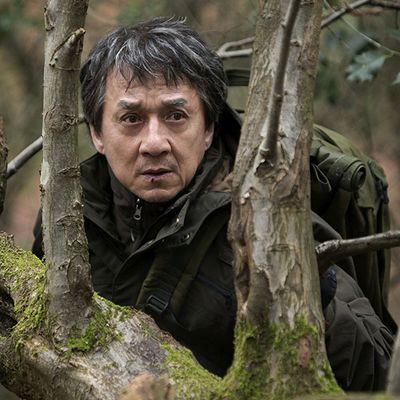
Jackie’s back in town and it’s nice to see him in something that isn’t so campy. The Foreigner is actually at the other extreme — it’s serious to a fault. Chan plays Quan Ngoc Minh, a Chinese restaurant owner whose wife and two daughters were killed years earlier while escaping Cambodia. He managed to save one daughter but, as luck would have it, she gets blown up in London by a rogue IRA group in front of her stricken father’s eyes. Quan understandably demands to know who did it. Less commonly, he shows up in Northern Ireland, where he quietly hounds — low voice, high explosives — ex–IRA soldier turned mainstream politician Liam Hennessy (Pierce Brosnan). The rub is that Hennessy doesn’t know who’s behind the terrorist acts either. He wants them out of the picture every bit as much as Quan does.
The Foreigner is fairly faithful to Stephen Leather’s first big-hit novel, The Chinaman, which came out in 1992, when both the peace and the status of Sinn Féin were still fragile. Twenty-five years on, with London confronting a different breed of terrorist, the timing seems odd. The plot is odd, too, insofar as the title character is almost peripheral, a thorn in the side of a man who’s desperate to bring down the bad guys without calling undue attention to his own participation and thereby alienating his IRA-sympathetic base. That makes Brosnan the more interesting protagonist, Chan the wild card — and changes The Foreigner from a standard revenge melodrama into something weightier and less predictable. It’s an awkward weave, but it has gravitas.
Chan’s Quan is haggard little man with rudimentary English, so eaten up by grief that he’s monotonic, immovable — until he fights, which Chan must or the audience would riot. There are a couple of good, staccato set pieces, but Chan is older and more bruised now, so you don’t get those flabbergastingly fluid takes or the Rube Goldberg–like ballets in which ladders were scaled and then turned into revolving weapons. Much of the time Quan is camouflaged in the woods adjacent to Hennessy’s country manse, where he makes like Stallone in Ted Kotcheff’s excellent Rambo picture, First Blood. The Vietnam parallels might have been more intriguing if the director, Martin Campbell, showed any zest for those action sequences, but they play like a diversion from the main narrative.
Campbell’s best scene is a late, crackling confrontation between Hennessy and Quan, but there are other highlights. Hennessy calls a meeting of pasty old ex-IRA men who came of age by killing and are trying — with varying degrees of success — to accommodate themselves to the new order. For all their formality, they still live, on some level, for revenge — which is why Quan’s daughter died, and why he’s preying on them. That ol’ vicious circle. Brosnan’s hoary Hennessy (he has a white beard) could be the aged version of the silent IRA killer he played in The Long Good Friday, who had an easier time when everyone’s loyalties were plain. Like Bob Hoskins’s Harold Shand, he has a young protégé whose allegiance is suspect, particularly with regard to his own wife. And that wife: She thinks Hennessy’s new role — ally of Downing Street — makes him less of a man. Who knows what she’s up to?
In the end, though, this is a revenge melodrama. We want Quan to get the scum (four men, one woman) who murdered his daughter and Hennessy to get the higher-up scum who gave the go-ahead. There’s a bit of torture in the last part of The Foreigner in which good guys try to extract information from bad guys, and I’m bound to say it didn’t bother me in the least. Like 24 and other red-meat thrillers, the ticking-time-bomb scenario is in effect, so characters can torture with moral impunity while the audience gets off on it.
The movie’s ending is far less downbeat than the novel’s, but a film that opens with a man’s daughter dead and mangled in his arms will never exactly be fun. Quan says, “I failed them,” meaning all four of the women in his life. And there’s no coming back from that.


